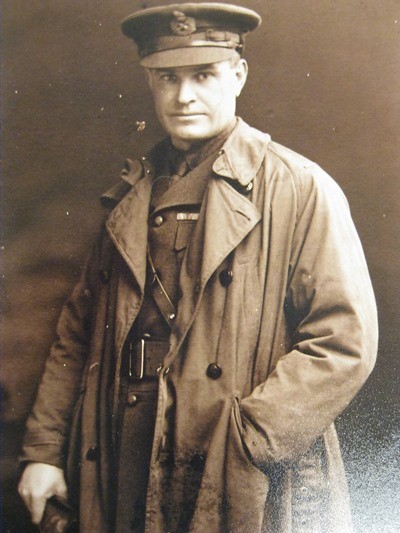
William Glasgow in France, ca. 1916-1917. 29571, Sir T. William Glasgow and Lady Glasgow Papers, State Library of Queensland.
Major General Glasgow was the highest ranking Queenslander to serve during World War I, rising through the ranks to become the commander of the 1st Australian Division. He served during the Boer War, and during the First World War at Gallipoli and on the Western Front. However it was at Gallipoli where his qualities of physical courage and exceptional leadership were first noted and where he won the admiration and love of his men and the recognition of his superior officers.
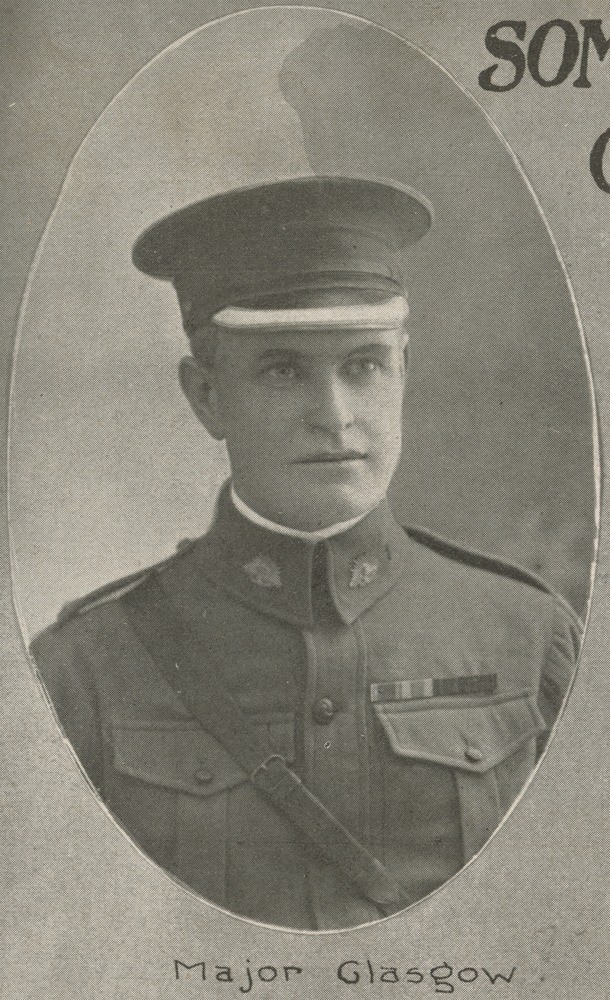
Major William Glasgow. Photograph from The Queenslander, 26 September 1914
At the time of the landing Glasgow, a Major with the 2nd Light Horse Brigade, was still in Egypt. He wrote the following letter to his wife, Belle, on the 2nd May 1915.
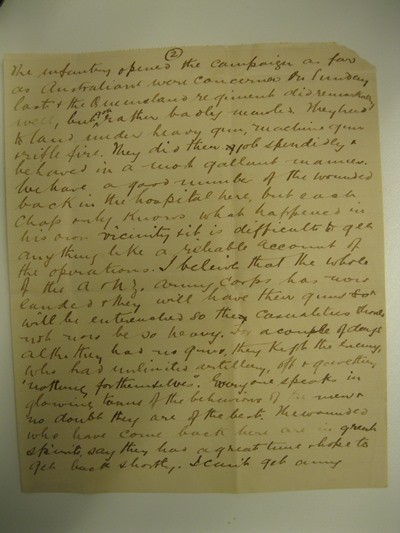
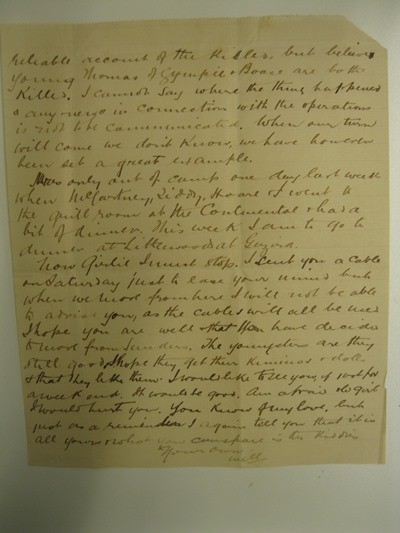
"The infantry opened the campaign as far as Australians were concerned on Sunday last & the Queensland regiments did remarkably well, but got rather badly mauled. They had to land under heavy gun, machine gun & rifle fire. They did their job splendidly & behaved in a most gallant manner. We have a good number of the wounded back in the hospital here, but each chap only knows what happened in his own vicinity & it is difficult to get anything like a reliable account of the operations. I believe that all of the A. & N.Z. Army Corps has now landed and they will have their guns so will be entrenched so the casualties should not now be so heavy. For a couple of days altho they had no guns, they kept the enemy, who had unlimited artillery, off & gave them 'nothing for themselves'. Everyone speaks in glowing terms of the behaviour of the men & no doubt they are of the best. The wounded who have come back here are in great spirits, say they had a great time & hope to get back shortly. I can't get any reliable account of the killed, but believe young Thomas of Gympie & Boace are both killed. I cannot say where the thing happened & any news in connection with the operation is not to be communicated. When our turn will come we don't know, we have however been set a great example." (Acc: 29571, item 88)
Glasgow did not have long to wait for his turn. The Second Light Horse landed at Gallipoli on the 12th May 1915. He writes to Belle "We are now taking our turn manning the trenches. The men are all doing splendidly. No tents are used but the rations are more than enough, men not being able to consume what is issued to them...I wish I could write you a long letter & say things but this has to be censored, so you will have to imagine what you know I would say to you." (24 May 1915, Acc: 29571/92)
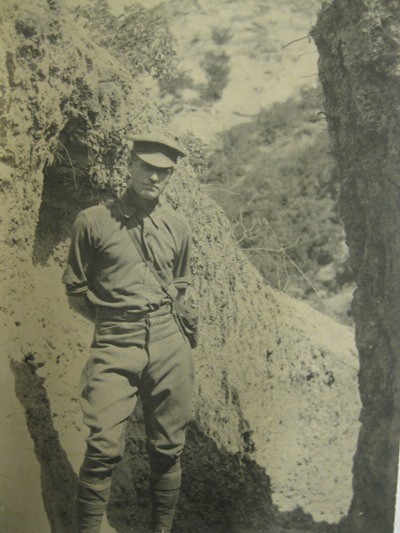
On May 29th Glasgow was with the garrison on Pope's Hill when it was showered with shrapnel. He suffered a wound through the thigh. The Reverend George Green, whose diaries are held in the John Oxley Library (OM77-14), describes the incident. "Major T.W. Glasgow although sent down to the beach for evacuation stole quietly to the right and quartered himself in the 3rd Field Ambulance where he had some pals among the doctors and was able to have his wound dressed. He returned to the regiment practically well on the morning of June 4th and well pleased all were to see him." When Green expressed sympathy for the wound Glasgow exclaimed "This! Why one would do anything - it's an honour to be blown to bits to support such fellows as these!". (OM77-14/3).
In a letter to Belle on the 6th June 1915 Glasgow writes "At present we are regular cave dwellers, all living in dug outs. The men are all in splendid spirits & what splendid fellows they are....I got a slight wound last Saturday week, a shrapnel bullet through the thigh. It was a very slight wound as I was able to walk 1½ miles to the ambulance where I stayed 4 days & then returned to duty...The food here is good & plentiful, we get Bully beef, ham, fresh meat, potatoes & more." (Acc: 29571, item 93)
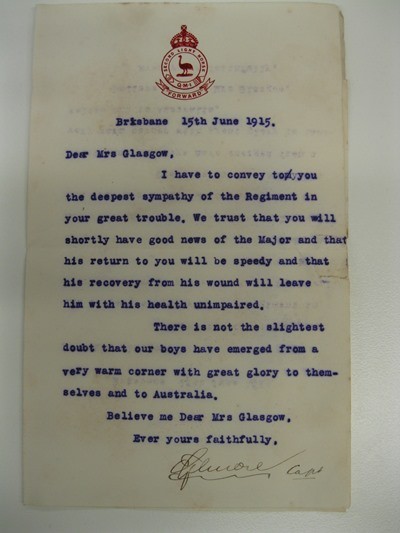
By midsummer the British attack at Gallipoli had stalled and the High Command decided on a last desperate attempt to break through the Turkish line. The Australians' part of the plan would be to attack Lone Pine, with Glasgow commanding the 1st Light Horse. On the 7th August 1915 Glasgow led the attack of the 1st Light Horse Regiment at the Battle of Dead Man's Ridge, going over the top with his men. The party of about 200 suffered 154 dead, wounded and missing, and every officer, except Glasgow, was hit. He was in the last group to retire from the battle. He was coming back with Lance Corporal Brian Keyes when they came across trooper J.W. Garrett, lying wounded. "We will take this lad down with us, Brian" Glasgow said. (Letter from Trooper Garrett, Reveille, 1 April 1937, p.24). The next day, in recognition of his exceptional leadership abilities and personal bravery, Glasgow was given command of the 1st Light Horse Regiment as Lieutenant-Colonel. Although the overall attack had failed and resulted in many casualties, Glasgow's well thought out plan of attack achieved a partial success. General Birdwood described him as "an exceptionally fine leader" and recommended him for a CMG (Order of St. Michael & St. George) to which he was duly appointed.
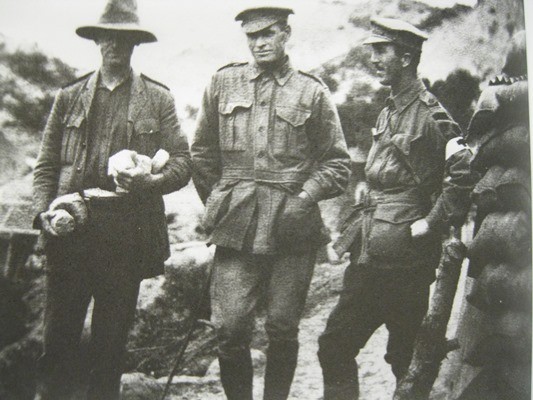
In September Lieutenant Colonel Stodart, commander of the 2nd Light Horse, was evacuated for a surgical procedure. Glasgow immediately transferred back to command his old regiment.
On the 10th November 1915 Glasgow, with some of his men, left the peninsula for Mudros, located on the island of Lemnos in Greece and used as an allied base during the war. He wrote to Belle "Just a line as I with portion of regiment am going off for a rest today...I expect to be away a month and when we return others will go..Have been feeling very well lately, some little time ago was a bit off, but it has worn off and I am now quite fit" (10 November 1915, Acc: 29571/111).
At Mudros Glasgow heard that the whole force would be evacuated from Gallipoli and that the 2nd Light Horse would be the last to leave on December 18th. He asked for permission to return to supervise the withdrawal but was refused. Glasgow disobeyed orders and returned to Gallipoli to see his men to safety. George Bourne who was acting commander of the regiment, feeling the strain of the evacuation, heard a familiar voice "It was a muffled voice, certainly, but there was no mistaking it. It was the voice of Colonel Glasgow. He had come back to look after us. Anxiety left me. Now there would be no hitch - and there was none!" (George H. Bourne to CEW Bean, 28/10/36, in Bean Papers, Australian War Memorial 38, #DRL 606 276 (1))
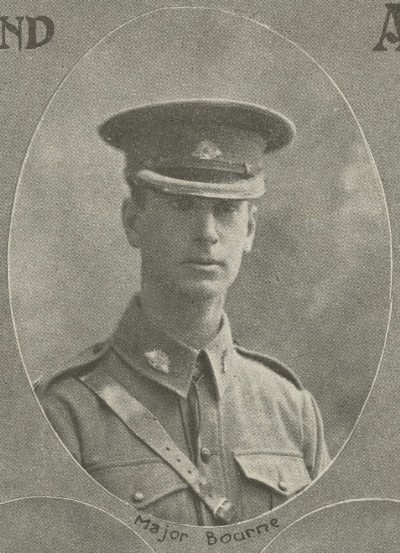
Glasgow in a letter to Belle writes "You will have heard ere this of the evacuation of the peninsular & of the success of it. I was still at Mudros when I heard it was to happen & went back to the men of my regiment who were still on the peninsular. I, with my men, came off the second last night & everything went like clockwork. It was pathetic leaving the place, but still if the situation demands it, we must accept it." (Heliopolis, 28 December 1915. Acc: 29571/112).
After the war Glasgow received a knighthood for his outstanding war service and returned to Australia where he entered federal politics. He was elected to the Senate as a Nationalist. In 1926 he was appointed minister for home and territories in the Bruce-Page government and from 1927 to 1929 served as minister for defence. During the Scullin government he was deputy leader of the opposition in the Senate. For twenty years he led the Anzac Day parades in Brisbane. In December 1939 Glasgow was appointed as the first Australian High Commissioner to Canada, a position he held until 1945 when he and Lady Glasgow returned to Queensland. He died in Brisbane on the 4th July 1955 and was given a state funeral.
See: 29571, Sir T. William and Lady Glasgow papers
Lynn Meyers, Original Materials Librarian.
Comments
Your email address will not be published.
We welcome relevant, respectful comments.